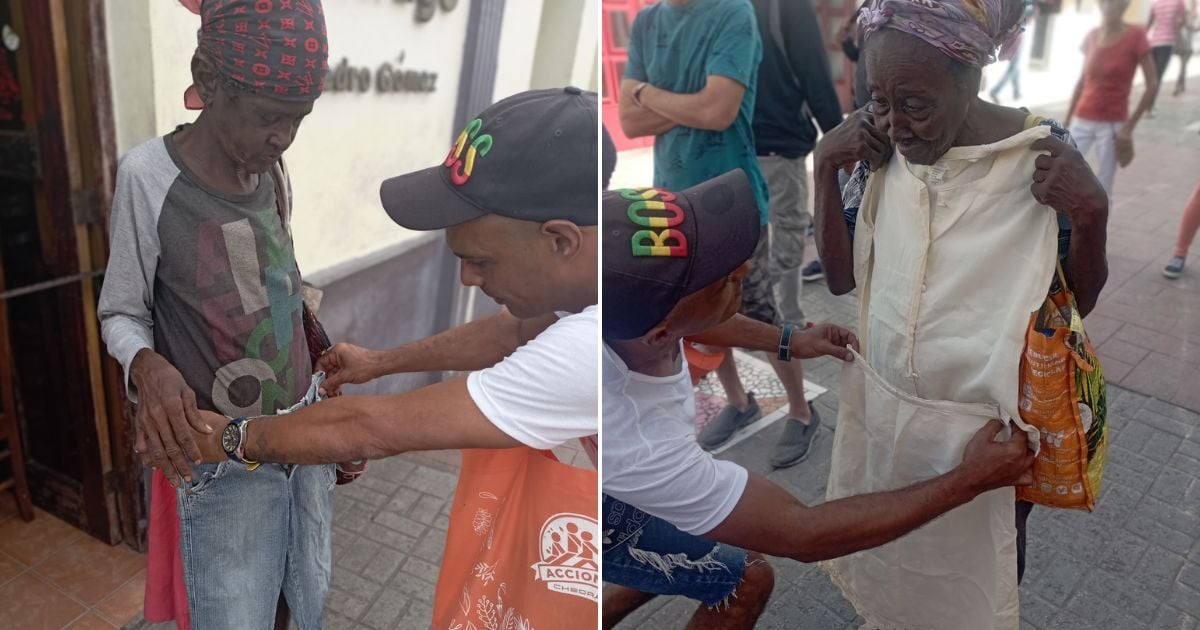
A Santiago activist performed a touching gesture of solidarity last Friday by walking along the Las Enramadas Heritage Corridor, known as the backbone of Santiago de Cuba's historic center, distributing clothing and shoes to those in need he encountered along the way.
Yasser Sosa Tamayo, known for his empathy towards the less fortunate, shared an emotional gallery of images on Facebook that captures the joy of several individuals, including elderly people, as they received the donations.
The activist reflected on social media about how the true value of individuals lies in gestures of love and solidarity, beyond appearances and material possessions.
Sosa emphasized that, at the end of the day, when the masks come off and we confront our own truths, what truly defines our worth are the smiles we manage to share, the acts of kindness we leave in our wake, and the impact we have on other lives.
Finally, he expressed his gratitude to those who, anonymously, support him in his selfless work, allowing him to bring joy to the needy in his community.
This is not the first time Sosa has engaged in such acts of solidarity. In November, the activist provided clothing and shoes to several women in Santiago de Cuba, offering them a moment of relief and hope.
That same month, he called for solidarity by highlighting the harsh reality of the elderly who wander the streets in extreme poverty and survive in neglect.
Regarding this social issue that the regime attempts to conceal, Sosa shared a gallery of images on Facebook revealing the harsh reality of abandoned elderly individuals, without homes or pensions, accompanied only by the faded memories of lives that once held meaning.
The Cuban Observatory of Human Rights presented the VII Report on the State of Social Rights in Cuba 2024 in July, revealing striking findings about the reality in Cuba.
The non-governmental organization highlighted in the document that "89% of Cuban families suffer from extreme poverty," which is one percentage point higher than last year and 13% more than in 2022.
One of the most significant pieces of information is that "7 out of 10 Cubans have stopped having breakfast, lunch, or dinner due to a lack of money or food shortages."
Frequently Asked Questions about Solidarity and Poverty in Santiago de Cuba
Who is Yasser Sosa Tamayo and what actions is he involved in in Santiago de Cuba?
Yasser Sosa Tamayo is a Santiago activist known for his humanitarian work in support of those in need in Santiago de Cuba. Among his efforts, he has distributed clothing and shoes to people experiencing extreme poverty, such as the elderly and vulnerable women, highlighting the harsh realities these individuals face under the Cuban regime.
What is the situation of the elderly in Santiago de Cuba?
In Santiago de Cuba, the elderly face conditions of extreme poverty; many wander without homes, lacking pensions and surviving on the little they can gather from alms. The Cuban regime has not effectively addressed this issue, prompting activists like Yasser Sosa Tamayo to denounce the situation and undertake acts of solidarity to assist these seniors.
How does extreme poverty affect Cuban families according to the Cuban Observatory for Human Rights?
The Cuban Observatory of Human Rights has highlighted that 89% of Cuban families are experiencing extreme poverty. This situation has worsened over time, resulting in many individuals, including children and the elderly, facing severe food insecurity and lacking basic resources due to the lack of effective action from the Cuban government.
What measures has the Cuban government taken regarding begging in Santiago de Cuba?
The Cuban government has approved a plan to remove beggars from the streets, assigning Municipal Administration Councils the responsibility for their care and oversight. However, the effectiveness of these measures is questionable, as extreme poverty continues to rise and vulnerable individuals are still not receiving the necessary support.
Filed under: